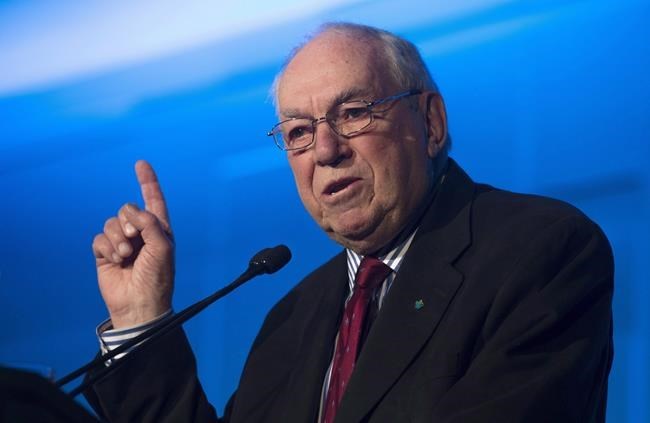OTTAWA — sa╣·╝╩┤½├Į's first provincial First Nations premier singled out Ed Broadbent as a beacon of civility in politics Sunday as generations of political leaders gathered to bid a final goodbye to the left-leaning luminary.
Wab Kinew, elected just last year as Manitoba's new NDP premier, acknowledged a stark reality: that the former federal New Democrat leader's death on Jan. 11 at the age of 87 could well mark the end of an era.
"Mr. Broadbent's smiling, joyful legacy is an example we ought to learn from today," Kinew said at Broadbent's state funeral.
"That we can use good means to achieve good ends; that we don't have to appeal to our darkest impulses; that we can have faith in our fellow Canadians."
Federal NDP Leader Jagmeet Singh fought tears as he recounted how Broadbent, by then well-established as the party's elder statesman, helped him learn how best to manage the party's helm in 2017.
"He wanted me to do a lot more, and a lot faster — very New Democrat of him. And he also wanted to make sure we never let the Liberals off the hook, also very New Democrat of him," Singh said.
"We are so fortunate that he chose to spend his life in pursuit of his vision and his hope of justice and fairness for all."
Singh added, choking back tears: "We will never forget him, and Ed, we won't let you down. And you're still who I want to be when I grow up."
New Democrats from across the country gathered to remember and celebrate Broadbent as a friend, mentor and political visionary.
Before the ceremony got underway, Prime Minister Justin Trudeau described Broadbent as a social justice champion who left sa╣·╝╩┤½├Į a better place.
"He was a tireless campaigner for social justice," Trudeau said. "sa╣·╝╩┤½├Į is significantly better for his years of service both in politics and out of it."
A long queue of mourners — many in sombre colours punctuated with a flash of the party's trademark orange — reached down the street and around the corner as the doors opened.
Flags on federal buildings were flying at half-mast in advance of what officials were billing less as a funeral and more as a celebration of Broadbent's life.
The former New Democrat leader served as an MP for more than two decades, including 14 at the party's helm in the 1970s and 1980s.
Broadbent's tenure as leader helped to usher in the modern-day NDP, building the foundation that allowed Jack Layton to lead the party to record results in 2011.
In that role, Broadbent faced off against four different prime ministers, including Pierre Trudeau, Brian Mulroney, John Turner and Joe Clark, who was scheduled to attend Sunday's funeral.
Others on Sunday's guest list included Gov. Gen. Mary Simon; Bob Rae, former NDP premier in Ontario and sa╣·╝╩┤½├Į's current ambassador to the UN; and British Columbia Premier David Eby.
Conservative Leader Pierre Poilievre was notably absent from the gathering and instead held a meeting with his caucus members on Sunday. Conservative MP Colin Carrie who represents Oshawa, Ont., attended the funeral.
Broadbent represented his blue-collar hometown of Oshawa, Ont., in the House of Commons for 21 years, including 14 as leader of the federal NDP, from 1975 to 1989. He briefly served as the MP for Ottawa Centre from 2004 to 2006.
Under his leadership, the NDP steadily expanded its seat count in the House — from 17 in 1974 to 43 in 1988, a record that would stand until the Layton era vaulted the party into official Opposition status 23 years later.
NDP strategist Brian Topp, who now leads the social justice institute Broadbent founded in 2011, described him as an academic and intellectual who very quickly learned the nuances of federal politics.
He was at once idealistic and practical, and in many ways the principal architect of the 2011 showing that delivered 103 seats, said Topp. Broadbent championed Layton's leadership and urged him to focus on winning support in Quebec.
That strategy, Topp said, bore "truly spectacular results" when the Layton-led NDP vaulted into official Opposition status for the first time in its history.
Broadbent also left his mark on the Charter of Rights and Freedoms after then-prime minister Pierre Trudeau reached out to the leader of the NDP to ask for his help in elevating the text of the document.
He was keenly interested in ensuring issues like equality for women, First Nations treaty rights and the West's rights over its natural resources were properly acknowledged in the document.
Long-serving NDP MP Charlie Angus has described Broadbent as a "bulwark" against efforts to undermine working-class priorities like wage levels, pensions and job security.
The day Broadbent died, the institute that bears his name cited his 2023 book, "Seeking Social Democracy," as leaving "an enduring vision and his hopes for what is to be done to build the good society for today and the future."
In that book, Broadbent made clear he believed the only path forward would have to be paved with the interlocking principles of democracy, social justice and economic fairness.
"To be humane, societies must be democratic," he wrote, "and, to be democratic, every person must be afforded the economic and social rights necessary for their individual flourishing."
Their elected emissaries must also treat each other with civility, he noted on the floor of the Commons during his farewell address in 2005.
"We tend to think that those 25 per cent of issues that divide us — and seriously and appropriately divide us — are only what matters," Broadbent said.
"What's more important in many ways, in a civilized, democratic, decent country, is the 75 per cent of things we have in common."
This report by The Canadian Press was first published Jan. 28, 2024.
Nojoud Al Mallees, The Canadian Press



